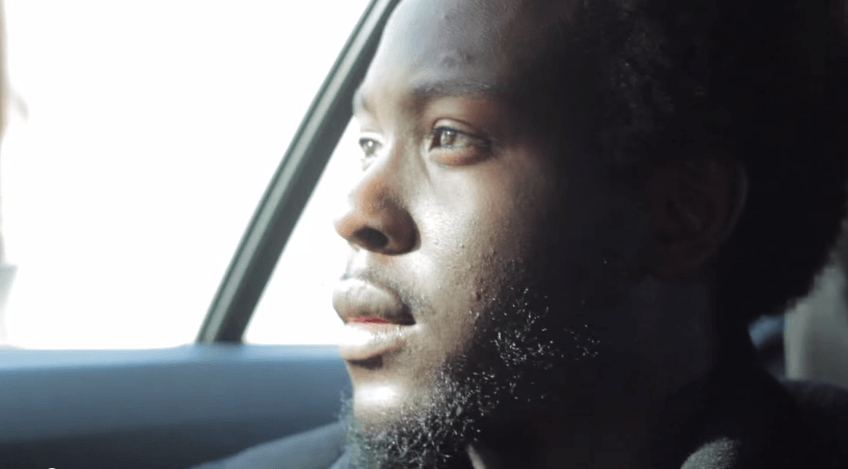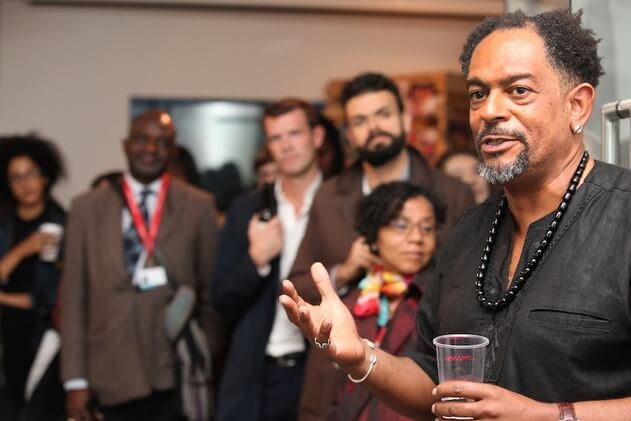
[In 7 days’ time it will be 10th November – the 20th anniversary of the executions of Ken Saro-Wiwa and 8 Ogoni colleagues. This blog is a response to a powerful poetry event at Peckham Platform last Friday, inspired by the work and life of Ken Saro-Wiwa. Come to the events on Nov 10th – a vigil in the morning and a night of extraordinary live performance and music in the evening ‘Dance the Guns to Silence’, at Rich Mix, London.]
What an intense experience of joy, to sit listening to the words of Caleb Femi – so rich, so precise, so relaxed. His poem, ‘The Children of the ‘Narm’ illuminating acutely his experience of growing up on an estate in North Peckham in the Major and Blair years.
‘We are the children of the ‘Narm,
the bareface ten year old dreamers
who saw North Peckham as a paradise
to the hell of Jos and Freetown and Yamoussoukro’
Caleb’s Youtube piece shows a visit to the area by the Housing Minister of the Thatcher government, William Waldergrave MP. This place of home had been typecast by the media as ‘one of the most notorious estates in London’.
‘We were in need of doctors and surgeons
And they gave us spin doctors’
The piece ends with defiant lines:
‘We are the children of the ‘Narm.
No longer children.
No longer ten years old.
No longer blind.
No longer helpless.’
Caleb’s performance was one of five acts in an evening Performance Salon at Peckham Platform last Friday, part of Michael McMillan’s exhibition ‘Doing Nothing is Not An Option’, in memory of Ken Saro-Wiwa. It was an intimate audience in this small space on the night before Halloween. We all sat in rapt attention surrounded by walls covered in images created by Michael, photographer Sam Roberts and young people from Theatre Peckham of the memorial Bus by artist Sokari Douglas Camp.
Zena Edwards sang the most beautiful song by Miriam Makeba, the civil rights activist. Her deep resonant voice transported my imagination from South London to Africa. It stretched me out across Europe, across the Mid-Atlantic and the Sahara to the delta of the Niger. It made that place not an elsewhere but here. Made it another room in the house of home. A continuum of space, like the territory of a Nightingale migrating back and forth from the Blackthorn scrub of the Thames valley to the Mangrove trees of Ogoniland.
Umaru Saidu fired us with his determination to stand with the Ogoni struggle in his poem ‘Idle no more’. And Sai Murray recited his dazzling piece, ‘Return’ that Platform commissioned for the 20th Anniversary of the murder of Saro-Wiwa and his 8 Ogoni colleagues:
‘The wind whispers: “Return”
Head looking backward,
the bird flies forward.
We turn.
Back. To where we came from’
Michael McMillan, who had created the evening as part of his exhibition and performance work at Peckham Platform, talked of Ken Saro-Wiwa. Of the presence of The Bus, the Living Memorial created by Sokari Douglas-Camp, which had been sited in Peckham Square and is now in Nigeria bound for Ogoniland. He read from Ken’s words:
‘I accuse the oil companies of practising racism because they do in Ogoni what they do not do in other parts of the world’.
And he told of how the body dies but the spirit continues. That Ken was with us in this gentle gathering, enjoying an evening of verse in his honour.
What a wonderful pleasure to listen to these poets in celebration of the Ogoni struggle. To know that this was one more act of defiance against those that would silence the memory of the murdered and silence the ongoing fight for justice and reparations in the Delta. Here were flames of desire and determination that burn brighter than the gas flares in Shell’s oil fields and pumping stations. What an irony and testament to the spirit that the brutal destruction of ecosystems and communities, of plants, animals, fish and human lives, should inspire such an upwelling of art – from these poets, to Sokari’s sculpture, to Nneka’s songs and George Osodi’s photographs. This ceaseless spring will, in time, dowse the gas flares and drown the oil fields.
Meanwhile, as Michael announced: “The Bus is on its journey from Peckham to Ogoniland”. To plan to send a public sculpture of this scale and fame across the seas and lands, from the heart of this city to the villages of the Delta, is an idea of such crazed innocence, that it will inevitably incure so many adventures and challenges. Yet it seems precisely the kind of exchange that can help shift our metropolitan minds, break the image of Delta as an elsewhere, blighted by oil and conflict, into part of here, part of a shared home. Peckham and Bori are parts of the same place, across which our imaginations can fly back and forth, now and far into the future.
As I leave the words of David Bowie’s ‘Memory of a Free Festival’ float into my mind. The song about a Free Festival organised by Beckenham Arts Lab in Croydon Road Recreation Ground on the 16th August 1969. It was timed to coincide with the great Woodstock Festival taking place far off in the Catskill Mountains of upstate New York. This intimate event, three miles south and 45 years before the night at Peckham Platform, stretched the spirit of the Summer of Love across the ocean, made that elsewhere here, and entered into the imagination of London. Bowie’s song contains a wonderful line that comes to mind and makes me think of the journey of The Bus:
‘It was ragged and naïve, it was heaven’


